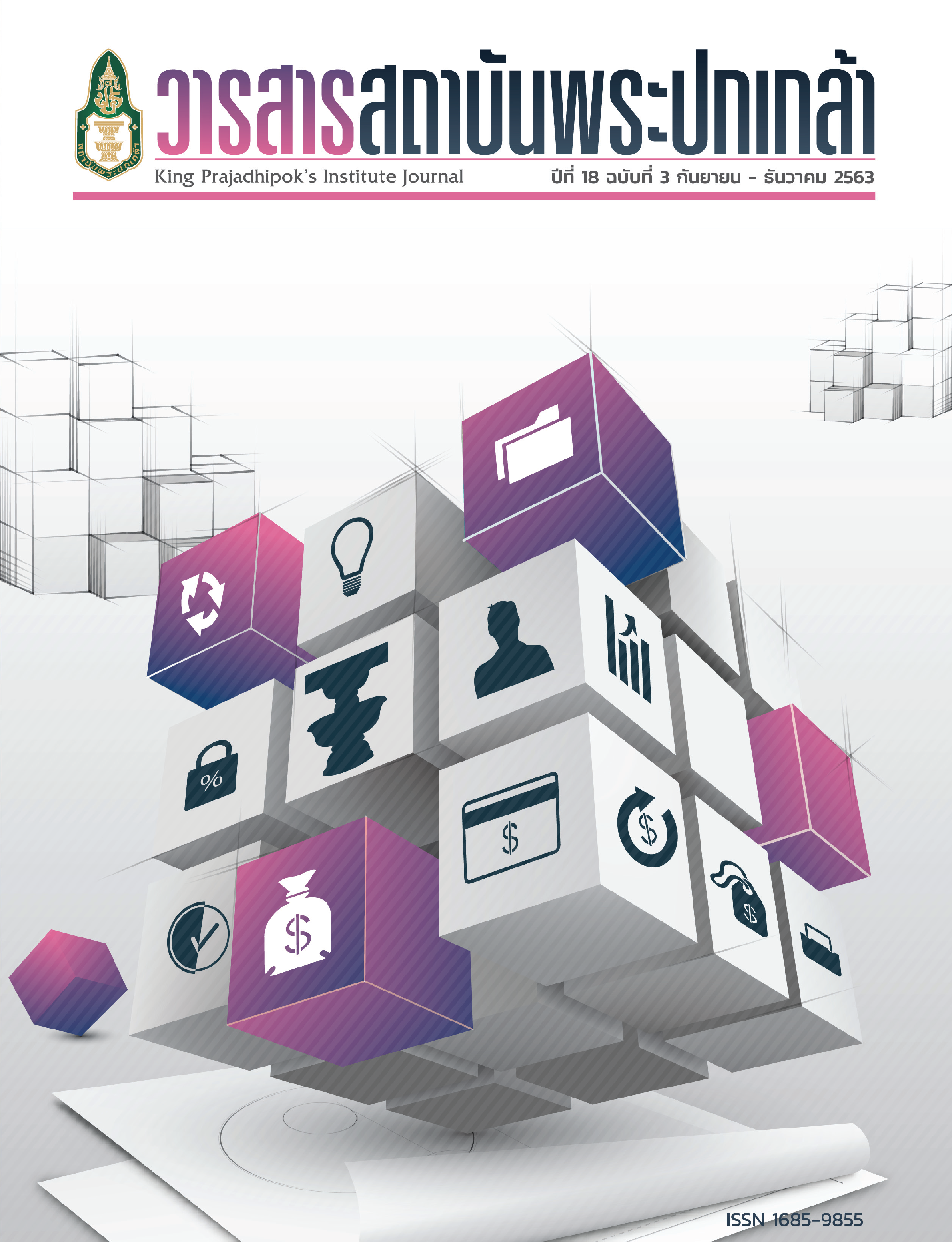Tracing the Concept of Good Citizens and Thai Civic Education in the Absolute Monarchy Era: Analyzing the Writings of Chaophraya Phrasadet Sunrentharathibodi (M.R. Pia Malakul)
Main Article Content
Abstract
This research paper aims to trace the concept of good citizens and Thai civic education in the absolute monarchy era by analyzing seven pieces of literature by Chaophraya Phrasadet Sunrentharathibodi (M.R. Pia Malakul). The study was done using content analysis to find the key terms for interpretation concerning the context of the literature and society at that time. The study found that the concept of good citizens and civic education were not suddenly instituted in Thai society after general education was introduced to the public. The concept of good citizens arose from the practice of educational management to create “good people” with Buddhist morality, “gentlemen”, and finally “good citizens”, who respectively have different levels of relations with the state. The role of good citizens in the absolute monarchy era can be linked to the concepts of the modern state and the body politic, which focus on the hierarchy of government. Hence, the role of citizens in this era is positioned as the “energy” of the country who would give support, especially regarding the economy and resources, to the country. So, education management for citizens in this era focused on general education
together with Buddhist ethical training and career training. It can be said that education provision for citizens in Thailand’s absolute monarchy era was “knowledge-virtue education”. Finally, the study revealed that having an understanding of good citizens cannot be achieved through study of citizens alone. It is necessary to understand the political regime holistically together with the roles and positions of other political actors to point out what the “good citizen” is.
Article Details
@ 2020 King Prajadhipok's Institute The Government Complex Commemorating All Right Reserved.
References
กระทรวงศึกษาธิการ. (2507). ประวัติกระทรวงศึกษาธิการ, 2435-2507. พระนคร: องค์การค้าของคุรุสภา.
โคเซอร์, ลิวอิส เอ. (2537). แนวความคิดทฤษฎีทางสังคมวิทยา ตอน แมกซ์ เวเบอร์ [Master of Sociological Thought : Ideas in Historical and Social Context] (อังกาบ กอศรีพร, ผู้แปล). กรุงเทพฯ: สำนักพิมพ์มหาวิทยาลัยธรรมศาสตร์ ร่วมกับมูลนิธิ โครงการตำราสังคมศาสตร์และมนุษยศาสตร์.
จุลจอมเกล้าเจ้าอยู่หัว, พระบาทสมเด็จพระ. (2508). พระราชหัตถเลขาและหนังสือกราบบังคมทูลของเจ้าพระยาพระเสด็จสุเรนทราธิบดี (แต่ยังมีบรรดาศักดิ์เป็นพระมนตรีพจนกิจและพระยาวิสุทธสุริยศักดิ์ พ.ศ. 113-118 พ.ศ. 2437-2442). หนังสืองานพระราชทานเพลิงศพท่านผู้หญิงเสงี่ยมพระเสด็จสุเรนทราธิบดี.
ไทยรัฐออนไลน์. (2558). ศธ.เดินหน้าปรับปรุงวิชาหน้าที่พลเมือง เพิ่มค่านิยม 12 ประการ. สืบค้นจาก https://www.thairath.co.th/content/513689
ประพัฒน์ ตรีณรงค์. (2504). ชีวิตและงานของเจ้าพระยาพระเสด็จ (เจ้าพระยาพระเสด็จสุเรนทราธิบดี). พระนคร: อุดมศึกษา.
วีระ สมบูรณ์. (2561). ทฤษฎีการเมืองกับความสัมพันธ์ระหว่างประเทศ. กรุงเทพฯ: ภาพพิมพ์.
วุฒิชัย มูลศิลป์. (2554). สมเด็จพระปิยมหาราชกับการปฏิรูปการศึกษา. พิมพ์ครั้งที่ 4. กรุงเทพฯ: พิมพ์ดี.
สมเกียรติ วันทะนะ. (2551). กำเนิดรัฐสมัยใหม่. วารสารสังคมศาสตร์และมนุษยศาสตร์, 34(1), 161-174.
สุเรนทราธิบดี, เจ้าพระยาพระเสด็จ. (2445). แบบเรียนจรรยา “สมบัติของผู้ดี” ของเจ้าพระยาพระเสด็จสุเรนทราธิบดี. พิมพ์ครั้งที่ 15. พระนคร: โรงพิมพ์อักษรนิติ.
สุเรนทราธิบดี, เจ้าพระยาสมเด็จ. (2464). จรรยาแพทย์ของเจ้าพระยาพระเสด็จสุเรนทราธิบดี. พิมพ์ครั้งที่ 4. พระนคร: โรงพิมพ์อักษรนิติ์.
สุเรนทราธิบดี, เจ้าพระยาสมเด็จ. (2477). เตือนเพื่อน. หนังสือในงานฌาปนกิจศพท่านเจ้าอธิการเคล้าธมมฺปาโล. ม.ป.พ.
สุเรนทราธิบดี, เจ้าพระยาสมเด็จ. (2479). พลเมืองดี ตอนต้น ของเจ้าพระยาพระเสด็จสุเรนทราธิบดี. พิมพ์ครั้งที่ 2. พระนคร: โรงพิมพ์อักษรนิติ์.
สุเรนทราธิบดี, เจ้าพระยาสมเด็จ. (2480). พลเมืองดี ตอนกลาง ของเจ้าพระยาพระเสด็จสุเรนทราธิบดี. พิมพ์ครั้งที่ 2. พระนคร: โรงพิมพ์อักษรนิติ์.
สุเรนทราธิบดี, เจ้าพระยาสมเด็จ. (ม.ป.ป.). พลเมืองดี ตอนปลาย ของเจ้าพระยาพระเสด็จสุเรนทราธิบดี. พิมพ์ครั้งที่ 4. พระนคร: โรงพิมพ์อักษรนิติ์.
หอประวัติจุฬาลงกรณ์มหาวิทยาลัย. (2554). 112 ปีพระราชทานกำเนิดจุฬาลงกรณ์มหาวิทยาลัย. สืบค้นจาก http://www.memohall.chula.ac.th/article/
เอกลักษณ์ ไชยภูมิ. (2562). บทสำรวจเบื้องต้นว่าด้วยอาริสโตเติลในสยาม. ใน โสรัจจ์ หงศ์ลดารมภ์, ปกรณ์ สิงห์สุริยา และเจิด บรรดาศักดิ์ (บรรณาธิการ), อาริสโตเติลในสังคมไทย (น. 23-100). กรุงเทพฯ: สำนักพิมพ์แห่งจุฬาลงกรณ์มหาวิทยาลัย.
Jory, P. (2015). Thailand’s Politics of Politeness: Qualities of a Gentleman and the Making of ‘Thai Manners’. South East Asia Research, 23(3), 357-375.
Loos, Tamara. (1998). Issaraphap Limits of Individual Liberty in Thai Jurisprudence. Crossroads: An Interdisciplinary. Journal of Southeast Asian Studies, 12(1), 35-75.
Rollo-Koster, Joelle. (2017). Body Politic. In Encyclopedia Britannica. Retrieved from https://www.britannica.com/topic/body-politic
Skinner, Quentin. (1969). Meaning and Understanding in the History of Ideas. History and Theory, 8(1), 3-53.


